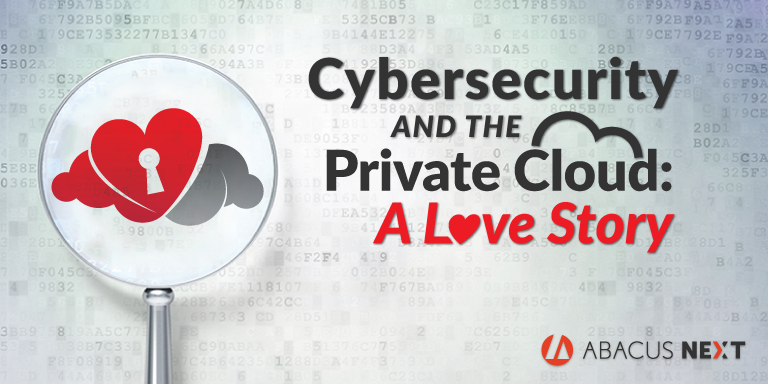Cybersecurity and the Private Cloud: A Love Story


The traditional love story starts with a romantic introduction, a whirlwind romance, a profession of love and culminates in sharing a home. However, in any good story there must be a villain – perhaps an ex, or a wicked stepmother, or even a jealous pet (speaking from personal experience) – that undermines their love, spread lies and rumors, or feeds them a poisoned apple. The star-crossed lovers must build a solid foundation of trust and respect with friends and family (or get a magical elixir from singing woodland critters) to defeat the villains and live happily ever after.
While this love story may seem like the dreams of Disney animators, there are similar situations happening in real life. Amal and George. Britney and Justin (never forget). And cybersecurity and the private cloud.
Yup, we went there.
Most businesses have been introduced to the public cloud. If you were dating a public cloud, you would describe your beloved as “cheap and cheerful”. They are accessed through giants like Amazon Web Services, are relatively inexpensive because your business avoids capital investment in hardware and applications. But like any bad dates they aren’t monogamous – in the public cloud, your data shares a server with many other companies. It’s like having your date flirt with the waitress in front of you – sure, they’re with you, but their attention is elsewhere.
Also, public cloud data centers are located around the world and your data can be anywhere, and the “pay as you go” pricing model allows businesses to easily scale at a very low monthly spend. But your data is on a server in an unknown location, shared by many. And the level of cybersecurity differs in the public cloud versus the private cloud. The public situation does not allow companies to meet Sarbanes Oxley or Payment Card Industry (PCI) Data Security Standards. If you do not have trust within a relationship, it’s over, and the same can be said for meeting these regulatory standards; your customers trust that you are protecting their information.
They are fun. They are cheap. They are pretty. But you don’t know who else the public cloud is seeing.
Why Care about Cybersecurity?
Not a day goes by that we do not hear of a data breach, whether from a mistake, professional hackers, or insiders. Most recently, the billion-plus Yahoo user account breach announcement topped the list. The monetary cost of these incidents is staggering and that does not account for damage to their brand. At this point, people are frightened by the possibility of identity theft and worse if their personal information passes to the wrong cyber criminals.
Just like a personal relationship, you only have one business reputation so do not risk it by putting critical, potentially life-affecting data on the public cloud. If your business’ SaaS platform contains customers’ payment information or your law or accounting firm client data is stored in the cloud, you need added security that cannot be found in a public cloud solution. Medium- to large-sized businesses that have security and regulatory compliance standards, like Sarbanes Oxley, PCI, and HIPAA, need the increased security of a private cloud. Unlike the public cloud, a private cloud allows for control over security and integrity of your data and applications. For example, a private cloud will offer two-factor authentication; multiple tiers of physical access, network, and data security; and fire suppression.
Privacy Matters
An easyway to think of the private cloud is the difference between an apartment building and a home. Both have security, but in the apartment, if you have one tenant who decides to allow others access to theirapartment by sharing the keys or access code or even leaving the main door unlocked, everyone is now at risk. With a home, the security system is customizable and not shared with others; there is no fear of the weakest link situation like in a multi-tenant building. In other words, with Abacus Private Cloud (APC) you are in a serious, monogamous relationship with your own home in the form of a dedicated, virtual server within a US data center.
The private cloud wants to build a relationship with you. It will protect you by mitigating risks and ensuring regulatory compliance. It will grow with you from your homebrewer phase through your backyard lumberjack stage (we get it, you know how to chop wood), because private clouds allow for a level of customization that is not possible in the public cloud.
It will plan for family dinners as it weaves together the local IT infrastructure, desktop and SaaS applications, and data into a fully integrated virtual home. And like the public cloud, there is no capital investment and is application agnostic. The private clouds loves you for you – no matter if you’re an Apple devotee or a PC virtuoso.
And it’s always available because the virtual workplace is accessible on any device and the system is automatically updated with the company having complete ownership of all data. It is fiercely loyal, offering data security, information handling, and data privacy protocols in accordance with NIST standards; higher than the public cloud. The scalability and efficiency of the public cloud still exist with private cloud, but APC allows businesses to manage their own deployment, which reduces costs and leads to increased profitability.
So this Valentine’s day, look for what matters and fall in love with the private cloud. We know you won’t be disappointed.
Click here to schedule a (demo) date.
By: Mary Juetten
Mary is an international writer, speaker, and mentorwho foundedTraklight.com, the only self-guided software platform that creates your custom intellectual property (IP) strategy and assesses business risk. She has dedicated her more-than-30-year career to helping businesses achieve and protect their success. In 2015, Mary co-founded Evolve Law to accelerate the adoption of technology within the legal industry.